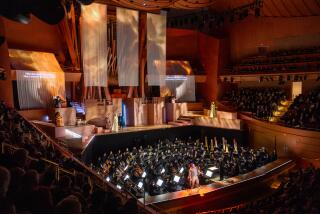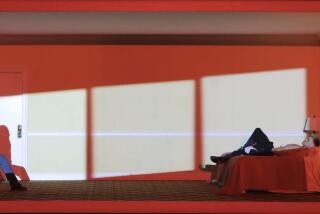2 Intriguing Versions of ‘Der Fliegende Hollander’
- Share via
“Der Fliegende Hollander” is the Wagner opera you’re likely to love if you don’t love Wagner. Relatively kind to the Sitzfleisch , too, at about 2 1/2 hours.
“Der Fliegende Hollander” is an early work, predating “Der Ring des Nibelungen” and “Tristan und Isolde” and partaking of a different artistic aesthetic. It’s a largely outdoor-romantic piece, set in a world of nature--and folksy super-nature (as in supernatural)--looking back to Weber’s “Freischutz,” but with hints of the complex harmonic language that would become part and parcel of the ultimately heavy Wagnerian baggage.
Dramatically, Wagner’s own libretto is simpler than anything one finds in his later works: a straightforward fable about redemption through love, or so it seems at first. As it turns out, there’s nothing straightforward about the obsessed-with-salvation Dutchman, or about the obsessed-with-the-Dutchman Senta. But compared to later Wagner, this one’s for kids.
For its new recording of the opera, London has assembled some of the bigger names among current Wagnerians under an authoritative conductor, Christoph von Dohnanyi, at the head of the mighty Vienna Philharmonic and excellent Vienna State Opera Chorus (London 436 418, 2 CDs).
Dohnanyi’s leadership is admirably fluid and balancing from the outset, supportive rather than indulgent of his singers. As the drama becomes more taut, the conductor achieves a fiery intensity that conveys the action masterfully.
The Dutchman is Robert Hale, who after a solid, decades-long but unremarkable career has become a major Heldenbariton --arguably, along with James Morris, one of the best Wotans around.
He sings here with utmost simplicity, which might be interpreted as a not-too-strong sense of character (the right sounds and right moves, but lacking no suggestion of dementia that is built into the character). His effort is, for the most part, strong and fluent, but the microphones cannot hide the incipient beat in high, fortissimo passages.
His companions are Kurt Rydl, a faceless, wobbly Daland; Josef Protschka, an appealing if at times vocally hard-pressed Erik and Uwe Heilmann’s sweetly elegant Steersman.
The problematic, to put it kindly, Senta is Hildegard Behrens: reasonably secure of voice on first encounter, but all too soon crossing over into hysteria, her voice in tatters.
*
Compare London’s product, reflective of 1990s vocal reality, with a “Hollander” reissue on the Berlin Classics label (2097, 2 CDs) of a 1962 recording once available here on Angel.
The late Franz Konwitschny, East Germany’s--and Leipzig’s--chief conductor prior to Kurt Masur, leads the Berlin Staatskappelle and Chorus of the Deutsche Oper in a performance that, from the first churnings of the overture to the soothing, redemptive chords of the final curtain, has shape, wit and high drama, to say nothing of the singers to project the conductor’s vision.
His Dutchman is Dietrich Fischer-Dieskau: poetic, haunted, sensitive and in superb voice (he never sang the role onstage), with not a trace of the hectoring that could mark (and mar) much of his work elsewhere. He and the Daland of the wonderfully black-toned Gottlob Frick--voice like a rock--are a show-stopping pair in their rollicking exchanges.
Rudolf Schock is an ardent, likable Erik and the unforgettable Fritz Wunderlich exemplifies luxury casting as the Steersman.
Marianne Schech is not the most distinctive or seductive Senta imaginable, certainly no match for Leonie Rysanek on the roughly contemporaneous London recording (417 319, 2 CDs), with George London’s grimly powerful Dutchman. But Schech’s bright soprano has more thrust and solidity than one remembers.
In short, this “Fliegende Hollander” is an altogether distinguished effort. One looks forward eagerly to Berlin Classics’ restoration of comparable recorded treasures from the recent past.
More to Read
The biggest entertainment stories
Get our big stories about Hollywood, film, television, music, arts, culture and more right in your inbox as soon as they publish.
You may occasionally receive promotional content from the Los Angeles Times.










